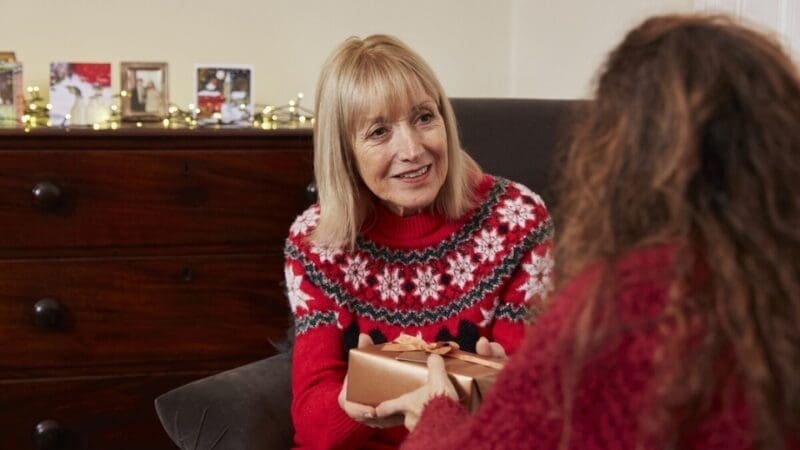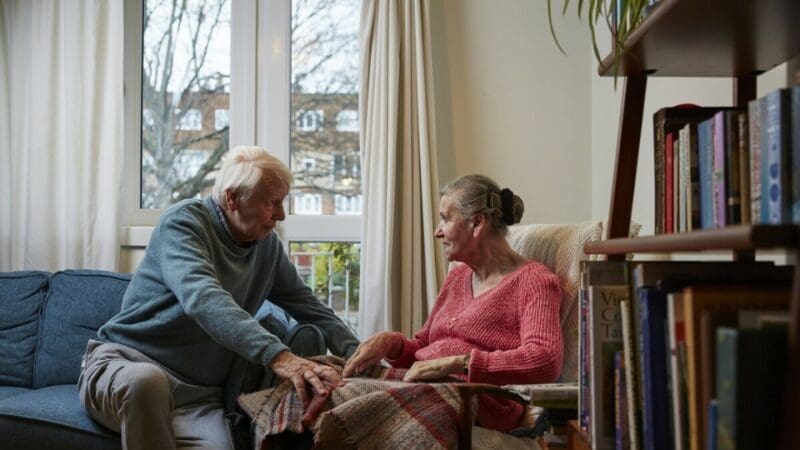
Christmas gifts for people with dementia
Our dementia specialist Admiral Nurses have put together suggestions for appropriate Christmas gifts for people with dementia

Rachel Thompson, Consultant Admiral Nurse for Lewy body dementia, talks about how dementia affects sleep and how carers and families can approach sleep disturbance and its possible underlying causes.
Rachel Thompson, Consultant Admiral Nurse for Lewy body dementia, talks about how dementia affects sleep and how carers and families can approach sleep disturbance and its possible underlying causes.
Disturbances in sleeping patterns are common among people with dementia and can become more problematic as the condition progresses. Someone diagnosed with dementia can become increasingly restless, confused, agitated, or distressed, particularly as the sun is setting and it becomes dark outside. This is known as ‘sundowning’.
There are many different types of dementia and some people may present with a combination of types. Regardless of which type is diagnosed, each person will experience their dementia in their own unique way. All types of dementia can affect sleeping but for people with specific types of dementia particularly Lewy body dementia or Parkinson’s disease dementia, sleep disturbance can be particularly common due to physical changes in the brain. For people with Lewy Body dementia this can include nightmares or night terrors and/or restless leg syndrome or uncontrolled limb movements.
Medications may also cause sleep problems, for example cholinesterase inhibitor drugs such as Aricept, Exelon and Reminyl, can cause night time stimulation and dream disturbance so where possible these should not be taken just before going to bed. Pain is also a major contributor to sleep deprivation and is commonly unrecognised and undertreated in people with dementia. If you suspect the person with dementia may be in pain contact your GP.
Look for changes in the person’s behaviour such as frequent waking, getting out of bed and/or increased disorientation or confusion. Deprivation and/or disturbed sleep is also a recognised risk factor for the development of delirium. Sleep can be disturbed by infections, due to an increased need to go to the toilet, dehydration and constipation as the person may be in discomfort. If you suspect these may be present an appointment should be made with the GP to investigate and treat any underlying causes.
If you do not know already, it is important to establish what is the usual pattern for people by asking the person. We are all different and people may have varying sleep patterns and need differing amounts of sleep. It is common for sleep patterns to change as we get older too. It helps to establish regular routines and offer comfort & reassurance. If people are feeling insecure and unsafe, they will feel less able to relax and get to sleep.
If someone gets up in the middle of the night, try to establish any cause for waking and think about sitting with them for a short time in a quiet environment with low lighting before guiding them back to bed. They may need to go to the toilet or be unsure about where they are. Having a night light and a clock which indicates day and night, may help orientate them and reduce distress .
A sleep diary can be used to monitor overall sleep and will help determine whether sleep is adequate. If the person is sleeping for particularly long periods during the day, then think about activities to keep the person occupied. Gentle exercise, access to natural light/getting outside and stimulation in the morning can help establish regular sleep patterns. Activities could include helping with housework, walks in a park, social activities, exercise and watching films.
Sleep disturbances may be a stage that the person with dementia goes through which will subside and settle over time. As dementia progresses people tend to sleep more. If problems persist then medical advice should be sought. Most importantly please discuss concerns with the GP so that any preventable or treatable reason for the sleep disturbance is identified and treated.
Rachel Thompson, Consultant Admiral Nurse for Lewy body dementia, is employed by Dementia UK and funded by the Lewy Body Society

Our dementia specialist Admiral Nurses have put together suggestions for appropriate Christmas gifts for people with dementia

Christmas activity ideas for a person with dementia for a fun and engaging time for all the family

Consultant Admiral Nurse for Frailty, Kerry Lyons, answers your questions about delirium, falls and incontinence.